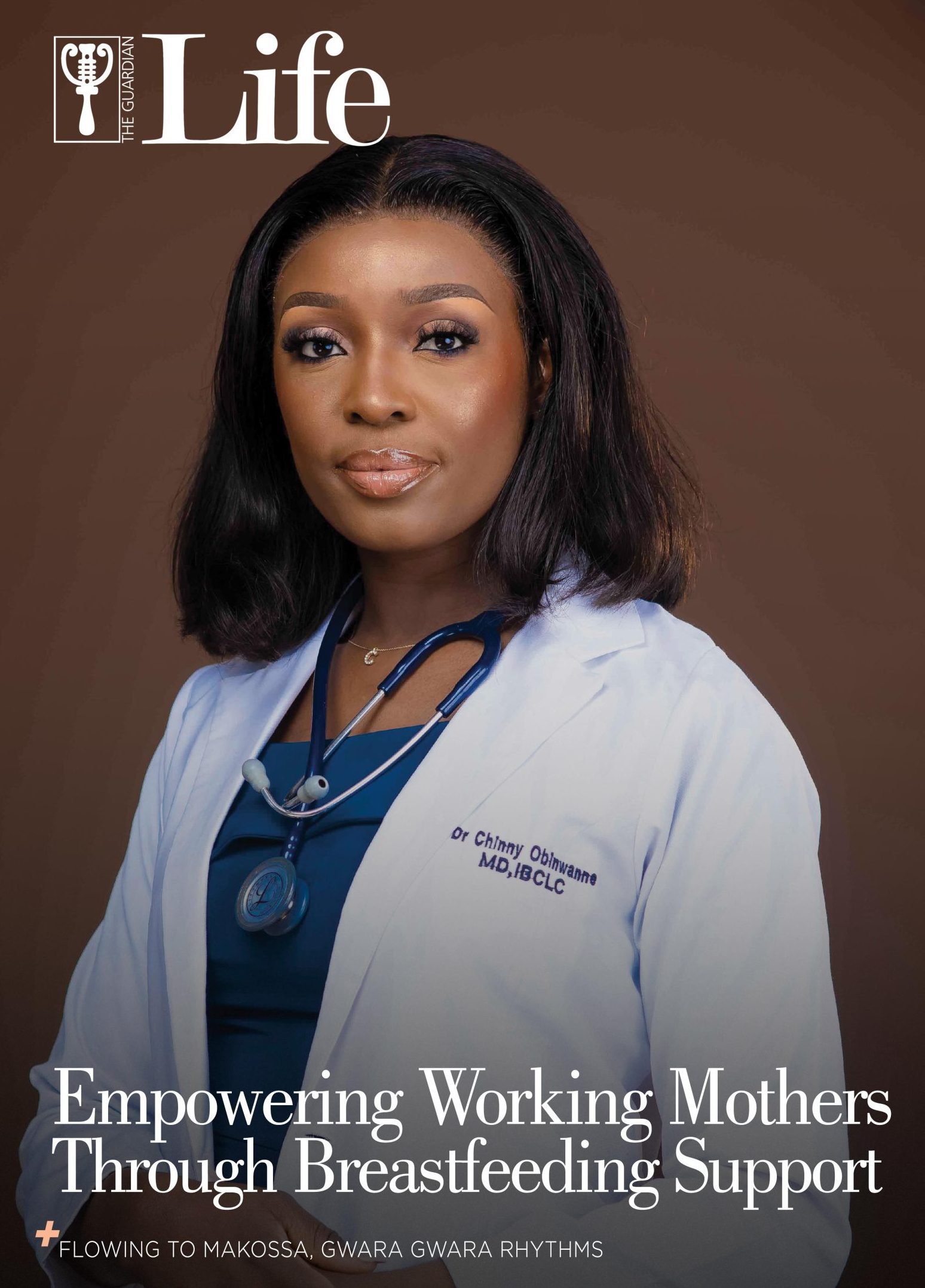
“Being a working mum, I understand the struggles that come with exclusively breastfeeding when having to go back to work. This burden fueled my determination to support other working mothers on their breastfeeding journey.”
[ad]
These were the words of Dr. Chinny Obinwanne, a certified lactation consultant practising in the UK and founder of Milk Booster and Breastfeeding Doc, as she reflected on the ups and downs of breast milk solutions and support to lactating women and mothers.
In line with this year’s World Breastfeeding Week, which started on August 1, and ends tomorrow, 7, with, “Let’s make breastfeeding and work, work!” as theme, this year’s campaign focuses on promoting practices that help support workplace-related breastfeeding in different countries.
A passionate advocate for breastfeeding, Dr. Chinny, as she is popularly called, has embarked on a mission to help other nursing moms overcome the challenge of balancing work and breastfeeding.
Drawing from her own experience as a working mother and expert knowledge, she has crafted a comprehensive plan to support working mothers, whether they are working full-time, part-time or in a hybrid arrangement. Her aim is to empower them to continue breastfeeding their babies while excelling in their professional roles.
“I encourage new mums going back to work to start preparing early from the first two weeks after delivery. By adding an extra pump session every day and storing the expressed milk, many of my mums have a milk stash by the time they are heading back to work in three months,” she said.
She further emphasised the importance of having open conversations with employers to discuss break times and pumping breaks, tailoring the plan to each mother’s situation.
The provision of low-sound wearable breast pumps has also proven to be a game-changer, allowing discreet pumping even in open working spaces.
Like most women with different stories to tell of their journey to childbirth, and importantly, the journey afterwards, Obinwanne had the challenge of producing enough breast milk to satisfy her newborn and her first child. She felt helpless and imagined she had failed as a mother.
“This was a big burden for me, especially, going back to work and having to be on-call overnight. The first night on-call, my baby did not sleep at all, even though I had pumped breast milk and left her with my husband to feed. She cried through the night and that led to a huge mum guilt for me. Based on my experience and expert knowledge, I have been able to draft out a workable plan for working mothers whether they are working full-time with on-calls or working part-time or hybrid,” she revealed.
Obinwanne said part of her support is to encourage new mothers who would be resuming work, “to have the difficult conversation with their Human Resource Department to discuss break times and pumping breaks. At this point, the response varies amongst mums and the organisation they work for and I tailor the plan according to what is feasible per mum.”
Beyond practical support, she spoke on the possibility of combining work and breastfeeding, while sharing inspiring stories of her own journey and that of other mothers who persevered; highlighting its possibilities as it is a phase. She spoke as an individual, who has experienced what is being discussed and not as a medical practitioner. “Showing stories of how I did it and how other mothers have done it,” she affirmed.
Through these layers of struggles, her eyes opened to the community of women facing such difficulty. She began to share the same solutions that increased her breast milk supply and started educating mothers on up-to-date breastfeeding practices through her book ‘Breastfeeding with Ease’, helping over 50,000 mothers achieve their breastfeeding goals.
Owing to her emerging solution, Obinwanne was contacted several times about the need for donor breast milk for premature multiple births. Thus, with the increasing demand for donor breast milk and a community of mothers with surplus breast milk, the dream became viable and she decided to launch the first human milk bank in Nigeria.
The Milk Bank’s Journey In Overcoming Challenges
“Honestly, it has been a challenge running a milk bank in Nigeria,” she opened up, while reflecting on the obstacles faced during this transformative journey. “So many factors are working against you, but we move for the sake of that one baby,” she added, emphasising the unwavering determination to provide life-saving nourishment to newborns in need.
One of the primary challenges The Milk Bank encountered from the outset was the daunting task of setting up the required machinery. With no previous groundwork in the region, they faced the daunting task of assembling and operationalising the necessary equipment.
Obinwanne recalls the struggle and joy of finally finding someone who collaborated with her UK supplier to set up the machinery, making it a reality. The financial aspect has also been an arduous journey. “Secondly was funding. Without any external funding, The Milk Booster has been funding the cost implication of running the milk bank,” she explained.
From staff salaries to the essential blood screening of each donor mother and the extensive pre-pasteurisation and post-pasteurisation milk screening, the financial burden has been substantial. However, despite the challenges, the team remains resolute in its mission to provide safe and nourishing donor human milk to infants in need.
Awareness and education have proven to be another significant hurdle for the bank. Despite receiving 20 recipient requests for human milk, Obinwanne noted that the majority of them do not proceed to the final steps of receiving the much-needed nourishment for their babies.
“After we engage them and do the paperwork, the majority of them don’t proceed to the final steps of receiving the milk. We’ve seen families that actually need this pasteurised donor human milk (PDHM) but due to culture and lack of adequate knowledge they choose against it. The lack of awareness and knowledge about the importance of pasteurised donor human milk (PDHM) and its potential benefits for infants poses a real limitation,” she said.
She revealed, “The awareness challenges stem from cultural beliefs and a lack of adequate knowledge.”
Sharing instances where families in desperate situations, with sick babies, have opted out of receiving PDHM owing to cultural reservations, she said there has also been a surprising lack of awareness within the medical community, with some professionals holding the belief that breast milk should not be pasteurised.
Despite these hurdles, she remained unwavering in her dedication to filling the gap and raising awareness about the immense benefits of PDHM.
Breast Milk Benefits
Breastfeeding holds immense benefits for both mothers and newborns. For newborns, breast milk provides essential nutrients, antibodies, and protection against various illnesses, reducing the risk of respiratory and gastrointestinal issues, allergies, and sudden infant death syndrome (SIDS).
“The benefits of breastfeeding go far beyond infancy,” her voice resonated with passion and expertise. “Breast milk is a remarkable source of nutrition and immunity for babies, providing immediate and lifelong benefits as they grow into adolescents and adults.”
For newborns, the first milk, known as colostrum, contains a rich concentration of antibodies that safeguard the baby’s gut lining, providing a vital defence against harmful bacteria and viruses. Breast milk is a perfectly balanced nutrition source, catering to a baby’s needs for the first six months of life. This natural nourishment significantly reduces the risk of various illnesses, including respiratory issues like pneumonia, gastrointestinal problems like vomiting and diarrhoea, and even allergies, eczema, asthma, and atopic dermatitis. Most importantly, breastfeeding has been proven to be a lifesaver, effectively lowering the risks of sudden infant death syndrome (SIDS) and Necrotising Enterocolitis (NEC) in premature babies. Obinwanne stressed, “the longer a mother breastfeeds, the lower her risk of developing breast or ovarian cancer.”
Furthermore, breastfeeding is associated with a reduced risk of high blood pressure, cardiovascular diseases, and diabetes, promoting overall maternal health.
According to the World Health Organisation (WHO), breastfed children tend to excel in intelligence tests, have a lower risk of being overweight or obese, and are less susceptible to diabetes as they grow older. Such advantages of breastfeeding necessitate the need to cater to mothers and babies experiencing breastfeeding difficulties. Summarily, as breastfed children are gifted with these extras to milking their mothers, so are mothers.
While the benefits of breastfeeding are widely recognised, working mothers often face challenges in maintaining breastfeeding routines. Obinwanne sheds light on this aspect, stating, “it is crucial for organisations to understand that supporting breastfeeding working mothers benefits both the mothers and the organisations themselves.”
By allowing mothers to continue producing breast milk for their babies, they can maintain focus and efficiency at work, leading to a present and effective workforce. She envisions a more aware and educated community. She emphasised the need for partnerships with healthcare organisations and continuous online and offline education to fill the knowledge gap. With such initiatives, Milk Bank aims to strengthen the support for breastfeeding and increase awareness of the vital role it plays in nurturing healthy lives.
As we look ahead, it is evident that breastfeeding is not just a nourishing act; it is a gateway to a brighter and healthier future for both mothers and their precious newborns. And with this genius initiative, no mother will feel like a failure on her first motherly duty as she did with her first daughter.
Know The Many Benefits Of Breastfeeding
• Enhanced Immune System
Breastfed children benefit from heightened resistance against infectious diseases, as breast milk provides a rich source of antibodies and essential nutrients, supporting their immune system’s development and overall health.
• Shield Against Inflammatory Bowel Disease
Breastfeeding has been linked to a substantial 31 per cent decrease in childhood inflammatory bowel disease risk. The protective properties of breast milk contribute to reducing the likelihood of this inflammatory condition in children.
• Reduced Obesity Rates
Any duration of breastfeeding brings a significant advantage in tackling obesity rates during adolescence and adulthood, with a noteworthy reduction ranging from 15 per cent to 30 per cent. Breast milk’s unique composition fosters healthy growth and metabolism, contributing to long-term weight management.
List Of Foods That Can Help Enhance Lactation
• Fennel Seeds
Fennel seeds aid in increasing breast milk supply, thanks to their oestrogen-like properties that serve this purpose effectively.
• Fenugreek Seeds
High in phytoestrogens, fenugreek or methi restores hormone levels and naturally boosts milk supply, making it an ideal lactation aid.
• Raw Nuts
Embrace the power of raw nuts like cashews, walnuts, and macadamia nuts, which are believed to support and enhance milk production.
[ad unit=2]








